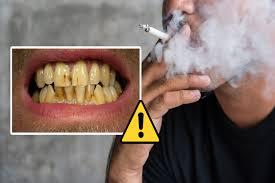Smoking is one of the most harmful habits for oral health, yet many people underestimate the damage it silently causes. From stained teeth to severe gum infections, smoking affects the mouth in ways that are often irreversible if ignored for too long. To understand the long-term effects of smoking on teeth and gums, we turn to Dr. Prachi Agarwal, a respected Dentist in Jaipur known for her expertise in preventive and restorative dental care. At Dr Prachi Dental Clinic, she regularly educates patients about how lifestyle habits like smoking can lead to major dental complications.
This detailed guide explains exactly how smoking affects your teeth, gums, and overall oral health — and why quitting is the best step you can take for a healthier smile.
1. Smoking Causes Heavy Tooth Staining
One of the earliest and most visible effects of smoking is yellow or brown tooth discoloration. Cigarettes contain tar and nicotine, which quickly absorb into the enamel, making teeth look dull and stained. These stains are often stubborn and do not go away with regular brushing.
Expert Insight:
According to Dr. Prachi Agarwal, professional cleaning and whitening treatments can help reduce stains, but repeated smoking will continue to damage the tooth surface.
2. Smoking Weakens the Gums
Healthy gums are essential for strong teeth, but smoking significantly reduces blood flow to gum tissues. This lack of blood supply affects healing, immunity, and overall gum strength. As a result, smokers are more likely to experience:
-
Gum infection
-
Swelling
-
Bad breath
-
Gum recession
Reduced blood flow also makes it harder for gums to heal after dental treatments or injuries.
Expert Tip:
Early gum evaluation at a reputed Dental Clinic in Jaipur can help detect gum disease before it becomes severe.
3. Increased Risk of Gum Disease (Periodontitis)
Smoking is one of the biggest risk factors for periodontitis — a severe gum infection that can destroy the bone supporting the teeth. Smokers tend to accumulate more plaque and tartar, making them prone to frequent infections.
Symptoms include:
-
Persistent bad breath
-
Loose teeth
-
Pain while chewing
-
Gums pulling away from the teeth
The worst part? Smoking masks some early signs of gum disease, meaning smokers may not notice symptoms until the condition becomes advanced.
4. Delayed Healing After Dental Procedures
Whether it’s tooth extraction, implants, or gum treatment, smokers often take much longer to heal. The chemicals in tobacco slow down the body's natural healing process, increasing the chances of complications.
For example:
-
Implants may fail due to poor bone healing
-
Extraction sites may become infected
-
Gums take longer to recover after cleaning or surgery
Experts explain that quitting smoking even a few days before a dental procedure can significantly improve healing results.
5. Increased Tooth Sensitivity and Decay
Smoking dries out the mouth by reducing saliva production. Saliva plays a critical role in:
-
Washing away food particles
-
Neutralizing acids
-
Preventing bacterial growth
Without adequate saliva, the mouth becomes more acidic, which weakens enamel and increases sensitivity and decay.
Over time, smokers often experience:
-
Frequent cavities
-
Sensitivity to hot and cold
-
Erosion of enamel
6. Persistent Bad Breath
Chemicals in tobacco stick to the teeth, gums, tongue, and throat, causing long-lasting bad breath. This smell does not go away even after brushing or using mouthwash because smoking affects deep oral tissues.
Good to Know:
Doctors emphasize that quitting smoking is the only permanent solution for smoker’s breath.
7. Higher Risk of Oral Cancer
One of the most serious oral health risks associated with smoking is mouth cancer. Tobacco contains carcinogens that directly affect the tongue, gums, throat, and inner cheeks.
Smokers are significantly more likely to develop oral cancer than non-smokers, making regular screenings extremely important.
How to Protect Your Teeth If You Smoke
While quitting smoking is the best solution, certain steps can help reduce the oral damage:
✔ Maintain Regular Dental Checkups
Getting routine cleanings and gum evaluations can catch early signs of damage.
✔ Improve Daily Oral Hygiene
Brush twice a day with a soft brush, floss regularly, and use an antibacterial mouthwash.
✔ Stay Hydrated
Drinking more water helps maintain saliva flow.
✔ Eat a Nutritious Diet
Foods rich in calcium and vitamin C help strengthen enamel and gums.
✔ Consider Professional Whitening
For heavy smokers, in-clinic whitening can help remove deep stains.
Why People Trust Dr. Prachi Agarwal for Smoking-Related Dental Problems
Smokers often face complex dental challenges that require expert evaluation and personalized treatment. Dr. Prachi Agarwal, a renowned Dentist in Murlipura Jaipur, is known for her precise diagnosis and gentle treatment approach. At Dr Prachi Dental Clinic, she uses advanced techniques to manage:
-
Gum infections
-
Stained teeth
-
Sensitivity
-
Tooth decay
-
Bone loss
-
Oral lesions
Patients appreciate her ability to explain problems in simple language and offer solutions that fit their lifestyle and oral health needs.
Final Thoughts
Smoking affects much more than just your lungs — it slowly damages your teeth, gums, and overall oral health. From staining and bad breath to severe gum disease and delayed healing, the impact is deeper than most people realize.
Regular dental checkups, early treatment, and quitting smoking can protect your smile and prevent long-term damage. And when it comes to expert dental care, many people rely on Dr. Prachi Agarwal, one of the most trusted names as a Dentist in Jaipur.



